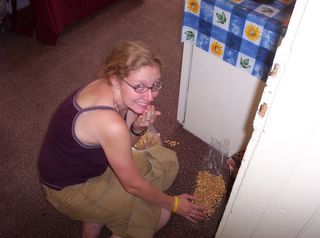Back in October of last year, I learned of how the Ethiopian coffee farmers who provide Starbucks with a good majority of their quality, $3 a cup coffee had applied for trademarks for three different types of their coffee beans (Sidamo, Harar and Yirgacheffe) in order to be able to earn more money for their product. After all, they are one of the top five poorest countries in the world with a GNP per capital of $110 and Starbucks made about $3.7 billion just last year. While Starbucks was selling some of these Ethiopian coffees for $26 a pound, the Ethiopian farmers weren't getting anymore than $1.10 of that (doing the math, that's about 4%). I think they could get a little more than that, don't you? Also, they had already successfully registered trademarks in the EU, Canada and Japan. Why does it always have to be so difficult in the US?!
When Starbucks learned of Ethiopia's application to the US Patent and Trademark Office for these coffees, they prompted the National Coffee Association of USA, Inc. to oppose the approval. And, as they say, money talks. The applications were denied, raising a huge red flag to Oxfam America, a non-profit and affiliate of Oxfam International that works to end global poverty through saving lives, strengthening communities and campaigning for change. They immediately alerted the public to this and implemented an international public awareness program that included a Day of Action where volunteers (including myself) went into their local Starbucks stores and politely informed the barista or manager there about what was happening and asked them to put pressure on headquarters to give the Ethiopians what is fairly theirs. They even made a short video of it and released it to YouTube (which, unfortunately, is private an not available for viewing anymore). These events also caused me and my nearest and dearest to boycott Starbucks and let everyone know just why we were doing it.
This prompted some response from Starbucks and the CEO met with the prime minister of Ethiopia to discuss some sort compromise, but Ethiopia stood strong in their stance for full trademarks. Thus, no agreement was reached. Oxfam continued with their campaign, and after months of pressure, progress was being made. It looked as if maybe Starbucks would agree to stop blocking the applications after all.
Finally, eight months after the campaign began, Starbucks announced that they have concluded an "agreement" with the Ethiopian farmers "regarding distribution, marketing and licensing that recognizes the importance and integrity of Ethiopia's specialty coffee designations." Oxfam celebrated this as a win-win situation for both Starbucks and Ethiopia. Now, what does this "agreement" exactly mean?
"It provides a framework for mutual cooperation to promote the recognition of the Harrar, Sidamo and Yirgacheffe designations and to strengthen the Ethiopian coffee sector, and includes the license of certain trademarks. The agreement allows Starbucks to use and promote these designations in markets both where trademarks exist for the coffee designations as well as where they may not, in accordance with agreed terms and conditions negotiated with Ethiopia."
"Certain trademarks"? I don't get it. I'm not economist, but to me, it seems like either Ethiopia gets the trademarks for their three coffees or they don't. I don't understand this "certain trademarks" thing. I really want to celebrate what seems to be a great victory for fair trade, but something just doesn't smell right to me. I wonder what sort of deals were made under the table, what the press releases are leaving out, and why they just don't say that the three trademark applications will no longer be blocked?
With Oxfam's approval, I can't see why this isn't a good thing. I really, really want to believe that the underdog won this round. But, maybe that's just it. Maybe this is just a round of a much larger match between corporate America and the countries they exploit. While I do celebrate what seems to be progressive steps forward, I can't help but hold my breath, waiting for the other shoe to drop...
Subscribe to:
Post Comments (Atom)


No comments:
Post a Comment